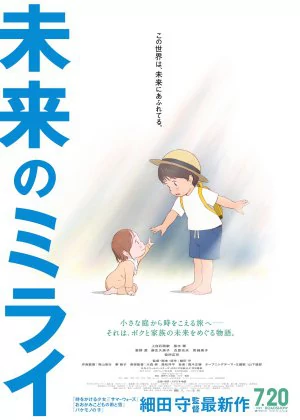Mirai
Mamoru Hosoda is an established name in the anime industry, so when he releases a new film it's quite an event and people take notice. That said, I didn't appreciate his previous project all that much, so my enthusiasm was somewhat tempered when I heard he had a new film out. Luckily Mirai [Mirai no Mirai] is a return to form for Hosoda, though mostly achieved by returning to what he excels at. Even so, fans of the man should have a blast with his latest, as there is plenty to enjoy here.
![screen capture of Mirai [Mirai no Mirai]](/thumbs/style/site/1200xauto/mirai-1.webp)
Hosoda is best known for mixing slice-of-life drama with more elaborate fantasy elements. He has a peculiar yet effective signature style where both genres are given the freedom to excel, at the same time making sure both genres also reinforce each other. When he went all-out fantasy with The Boy and the Beast (his previous film) the result really wasn't all that. The film was technically accomplished but it lacked heart and restrain, while the fantastical elements looked uncharacteristically uninspired. For once I am glad to see a director return to his roots, even if that means that in the end we're roughly getting more of the same.
With Mirai, Hosoda tackles the welcoming of a second child into a young and brittle family, abruptly distorting the established dynamic. As an only child (with no children of my own), I had no trouble empathizing with the drama though. It's not the first time a film or book handles this subject and Hosoda is quite detailed in exploring the different facets that disrupt the hard-fought balance of a single child family by the arrival of a second toddler. It also helps that the drama is magnified by the fantastical interludes, further underlining the prime dramatic drivers.
The film follows Kun, a young boy who lives happily with his mom, dad and dog. That is, until one day, when his mother returns with Mirai, a young baby girl. Kun's mom's attention shifts to Mirai while dad has to take care of Kun and the household. Chaos ensues as everyone tries to get used to the new situation, but Kun can't get past the feeling that his parents have abandoned him. Every time he acts out though, he is given a glimpse into the lives of his family members, allowing him to better understand his place and responsibility as part of their family unit.
![screen capture of Mirai [Mirai no Mirai]](/thumbs/style/site/1200xauto/mirai-2.webp)
The animation is a serious step up from previous Hosoda projects. Character designs are clearer and more detailed, the backgrounds are richer and more elaborate and even though the camera work can get a little too showy at times, it does make for a very dynamic and lively feel. The fantasy bits are creative, original and attractive and while there's a very real inclination to compare Mirai to the work of Miyazaki, it would be a disservice to the many ways that Hosoda differentiates his work from the trademark Ghibli style. It's nice to see Hosoda's style evolve like this, it's not quite up there with the best yet but it's a solid step in the right direction.
The soundtrack is a little less defined. Simple but upbeat, pop-inspired music that creates a nice atmosphere, but feels more than a little expected. There's a returning theme that is charming, warm and comfortable enough, but does get a little boring after a while. Overall it's not a bad soundtrack, just pretty predictable. The voice acting on the other hand is a good step up from the default anime dub, featuring voices that feel more humane and lifelike. Kun can get a little annoying and grating at times, but that is always be design as it is what his character demands. Not sure if there are multiple dubs available, but as always, there really is no point to switch from the original one.
![screen capture of Mirai [Mirai no Mirai]](/thumbs/style/site/1200xauto/mirai-3.webp)
What makes Mirai so special is that the fantasy interludes truly reinforce the drama. While fantastical enough in nature, they aren't all that over the top and they properly reflect on the obstacles Kun is facing. Because of that, there's always an incentive to leave the fantasy world again and to get back into the core of the story, something other films who have tried this particular mix often had trouble with. There really is no dominant genre here, which is probably the most important sign that the blend of genres is as seamless as should be, even when both genres rarely coincide in the same scene.
Mirai is a really fine entry in Hosoda's oeuvre. It's a film that fits right in, but also refines and adds to what he put out before. But most of all it's a confirmation that he still has it in him. His previous work has been on a downwards spiral for quite a while now, it's good to see that he was able to turn things around. Mirai is lushly animated, features a competent score and above average voice acting , but most of all it has a strong and beautiful heart that keeps the drama both relevant and touching. Hosoda is back on the right track, let's hope he keeps evolving in this direction.
